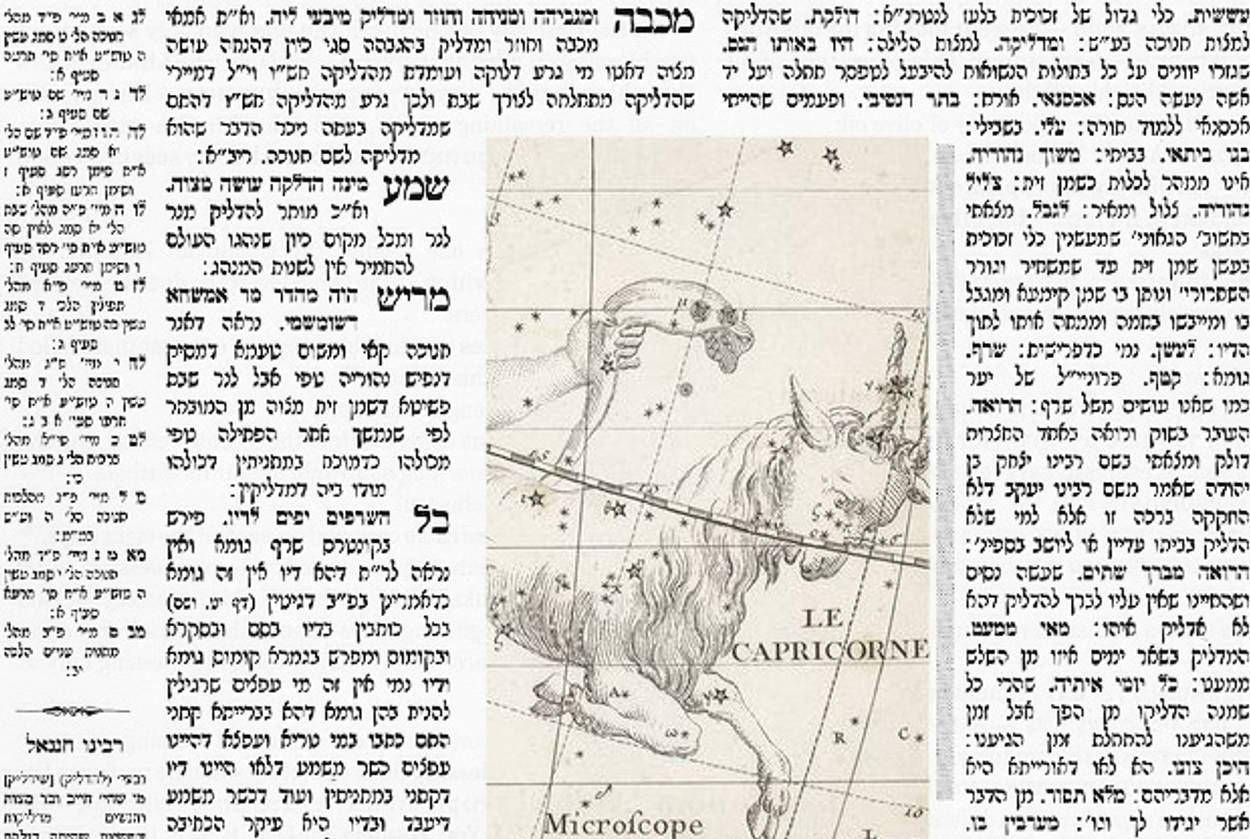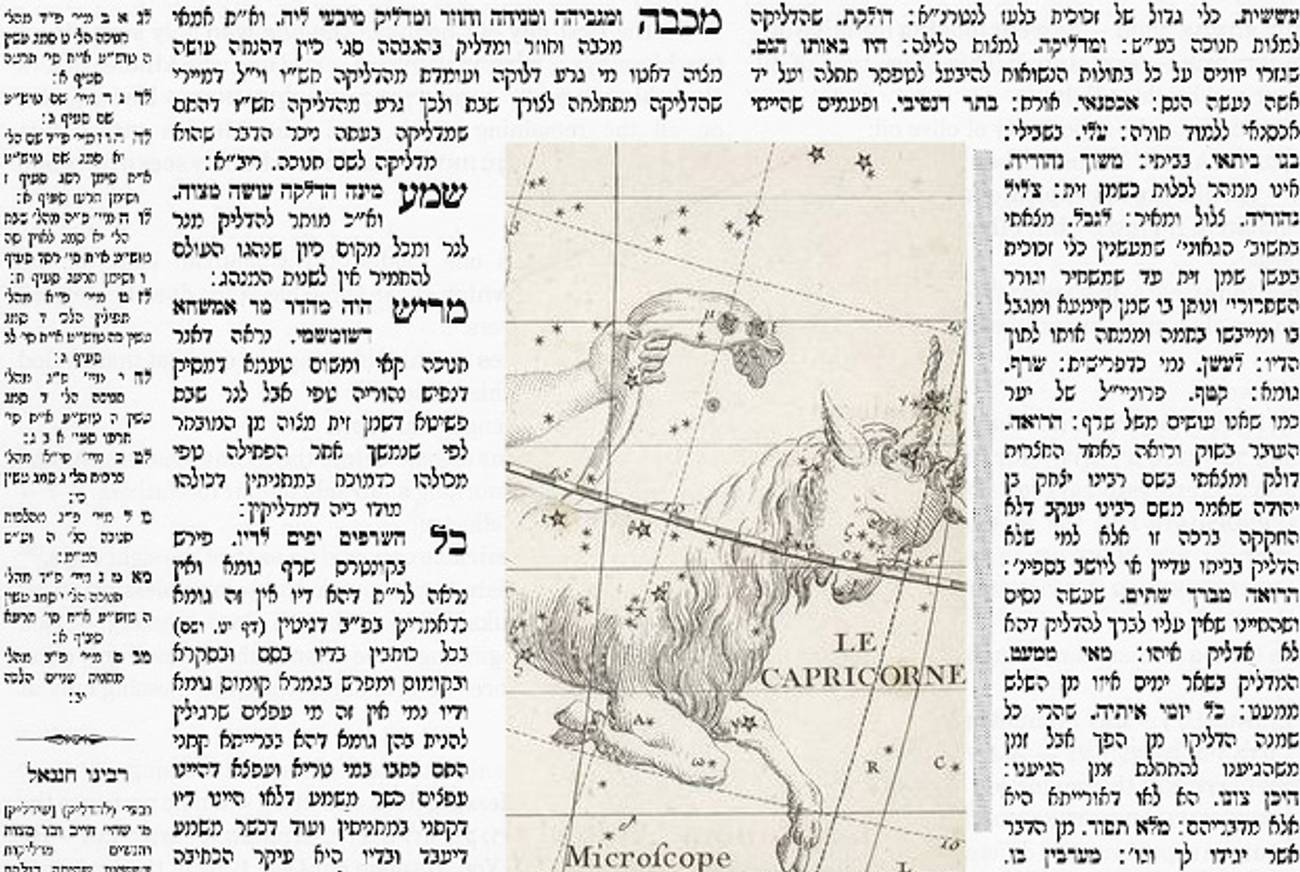Written in the Stars (Or Not)
To overcome fated lives, the Talmud’s rabbis argued, perform virtuous acts according to Torah




Literary critic Adam Kirsch is reading a page of Talmud a day, along with Jews around the world.
Most often, when Jews use the phrase mazel tov, they simply mean “congratulations”—it’s the kind of thing you say when you hear about someone getting married or having a baby. Literally, however, mazel tov means “good fortune,” as in “may you have good fortune.” Still more literally, I learned in this week’s Daf Yomi reading, mazal means a constellation, and wishing someone a good mazal means hoping that the stars will be in their favor. In other words, mazel tov is a relic of astrology, the belief that the orientation of the stars can affect human destiny. As such, it seems to pose a significant challenge to the basic Jewish idea that God and God alone rules the universe. Should Jews believe in mazal?
This issue came up as part of a long digression in the final chapter of Tractate Shabbat. Chapter 24 begins by discussing several aspects of Shabbat law having to do with animals. We know that it is forbidden for a Jew to do work on Shabbat; but is it permitted for him to use an animal to do work for him? Say, for instance, that you are traveling on Friday evening and Shabbat begins. What should you do about your money pouch, which you are not allowed to carry? The best option, the Mishna tells us in Shabbat 153a, is to give it to a Gentile to carry. But this seems to contradict a ruling made earlier in the tractate, that it is forbidden for a Jew to ask a Gentile to break Shabbat laws on his behalf. “What is the reason the Sages permitted him to give his pouch to a Gentile?” asks the Gemara.
The answer displays the same kind of psychological realism we saw in last week’s discussion. “A person does not restrain himself with money,” the Sages observe. If the law required a Jew to simply abandon his money pouch on the road, the odds are he would not obey the law, since any person’s strong instinct is to guard his money closely. It’s better, the rabbis reason, to allow a Jew to entrust his money to a Gentile than to tempt him to flout the law altogether.
And what if you happen to be traveling alone? Then, the Mishna instructs, you should place your money pouch on your donkey, to avoid carrying it on Shabbat. Here too, however, there are legal complications. As the Gemara points out, Exodus 20:10 seems to forbid loading an animal on Shabbat: “And the seventh day is Shabbat for the Lord your God, you shall not perform any manner of labor, neither you, nor your son … nor your animal.” Doesn’t the Mishna’s ruling contradict the Torah?
This question gives rise to an extended discussion, in which various sages take different positions. Rav Adda bar Ahava suggests that loading an animal that is already walking does not constitute full-fledged loading, so that the donkey is not really performing a forbidden labor. Rami bar Chama takes a stricter view, holding that using a donkey to violate Shabbat is just as bad as violating it yourself and deserves the same punishment—that is, death by stoning. Yochanan, however, believes that such an act deserves no punishment at all, since a Jew is only liable for infringements he performs in person.
From here, the Talmudic discussion moves to another animal-related question. Earlier in Tractate Shabbat, there were extended debates about what kind of food preparation is permitted on Shabbat. But all of that had to do with preparing food for human consumption. What are the rules about working on Shabbat to prepare food for animals to eat? On this issue, the rabbis fall into two camps. According to Rav Huna, it’s allowed to set out food that is already edible: Thus it is permitted to untie a bundle of grain and spread it out before an animal. But Huna forbids doing any work to render food edible in the first place. Thus he forbids the untying of bundles of cedar branches, since a bundle of cedar branches cannot be eaten, though individual branches can be.
Rav Yehuda, however, takes just the opposite view. For him, it is all right to make food edible, but not to “exert oneself on Shabbat with food that is already in an edible state.” Thus Yehuda would not allow a Jew to crush hay for a horse to eat, since hay can already be eaten uncrushed. On the other hand, he would permit chopping up an animal carcass on Shabbat, in order to feed it to dogs. But wait, the Gemara objects: Isn’t an animal carcass already soft enough for dogs to eat? The answer is one of those brilliantly impractical suppositions that the Talmud often resorts to. What Yehuda must have had in mind, the rabbis conclude, is “elephant flesh”! Surely the Jews of Babylonia were not in the habit of feeding their dogs elephant meat. But the Gemara must find a way of making sense of Rav Yehuda’s ruling, and even the most empirically far-fetched solution is better than suggesting that Yehuda was simply wrong. As always, the prime value for the Talmud is to justify its authorities, to make some kind of sense of their rulings, even if that sense seems nonsensical to us.
Later in this discussion, several rabbinic opinions are cited as being “from the notebook” of this or that sage. This formal device allows the Gemara to introduce an unrelated group of sayings from the notebook of Rabbi Yehoshua ben Levi, having to do with the character traits associated with being born on each day of the week. Even today, some people still believe that being an Aquarius or a Libra means having a certain kind of personality. Yehoshua believed the same thing, but about Mondays and Tuesdays and so forth.
To give this idea a Jewish twist, he deduced the characteristic of each day from what is said about it in the Creation story in Genesis. A person born on Sunday will be either “completely for the best or completely for the worst,” because on the first day God created both light and darkness. A Monday person is argumentative, because on the second day God separated the waters above from the waters below, introducing the principle of division and contention into the world. Tuesday people are promiscuous, like the plants created on that day; Wednesday people are enlightened, since the stars were created on that day; Thursday people are kind, because the fifth day God created the fish and fowl, who do not work for their sustenance but live by God’s kindness alone. Friday people are seekers of mitzvot, since Friday is the day devoted to preparing for Shabbat.
As for one born on Shabbat itself, the Talmud offers her both a blessing and a curse. On the one hand, being born on Shabbat means being “a person of great sanctity,” since it is the holiest day. On the other hand, as we have seen earlier in Tractate Shabbat, a baby born on Shabbat requires the holy day to be violated in various ways. This is permitted for the sake of preserving life, but it is nevertheless a violation, for which the child will pay by dying on Shabbat. “One who was born on Shabbat will die on Shabbat, because they desecrated the great day of Shabbat on his behalf.”
After this list of fatal natal days, Rabbi Chanina proposes a different astrological system, one that seems totally pagan, having no relationship to Genesis. For Chanina, everything depends on which planet was in the ascendant at the hour of one’s birth. (The Koren edition helpfully supplies a chart to determine which planet reigns over each hour of each day.) If you were born, say, at noon on Tuesday, you’re in luck—your planet is Jupiter, whose Hebrew name is tzedek, and so you will be a just person, a tzadkan. If, on the other hand, you were born at 3 a.m. on Wednesday, your planet is Mars, and you “will be one who spills blood”—either a criminal or a ritual slaughterer or even a mohel.
To us, this kind of fatalistic thinking seems utterly contrary to the spirit of ethical monotheism. If the kind of person you are depends on when you were born, what becomes of the idea of free choice, or of reward and punishment? Rabbi Chanina evidently had no problem with all this: “A constellation makes one wise and a constellation makes one wealthy,” he said, adding that “there is a constellation for the Jewish people.” Even collective Jewish fate, it seems, is governed by the stars.
But to this Rabbi Yochanan strongly objected: “There is no constellation for the Jewish people.” He cited a verse from Jeremiah: “Thus saith the Lord: Learn not the way of the nations, and be not dismayed at the signs of heaven.” And the Talmud goes on to give exemplary cases of Jews who escaped what seemed to be their predetermined fates. One day, Shmuel and a Gentile sage named Ablet were sitting together, and they saw people going to the lake. “Ablet said to Shmuel: This person will go and he will not return, because a snake will bite him and he will die.” Shmuel, however, responded, “If he is a Jew, he will go and come back.”
When the man indeed returned in one piece, Ablet opened his pack, and inside it he found a snake cut into two pieces. The man, evidently a Jew, had managed to elude his fate—but what explained his narrow escape? The man explained that he had performed a mitzvah: “Today there was one of us who did not have bread, and when it came time to gather the bread, he was embarrassed because he did not have any to give. I said to the others: I will go and take the bread. When I came to the person who did not have bread, I rendered myself as one who was taking from him so that he should not be embarrassed.” For the mitzvah of sparing a poor man embarrassment, this Jew was rescued from the snake.
This is not exactly how we might want the Talmud to deal with the question of fate. After all, the story does not deny that men have fates, that mazal rules over us. It only says that a Jew is able to nullify his mazal by performing virtuous acts. There may be a constellation for the Jewish people, but it comes with an escape clause: life according to Torah. At the end of a long, sometimes arduous journey through Tractate Shabbat, here is a rare but striking example of how God rewards those who obey his many commandments.
***
Like this article? Sign up for our Daily Digest to get Tablet Magazine’s new content in your inbox each morning.
Adam Kirsch is a poet and literary critic, whose books include The People and the Books: 18 Classics of Jewish Literature.
Adam Kirsch is a poet and literary critic, whose books include The People and the Books: 18 Classics of Jewish Literature.